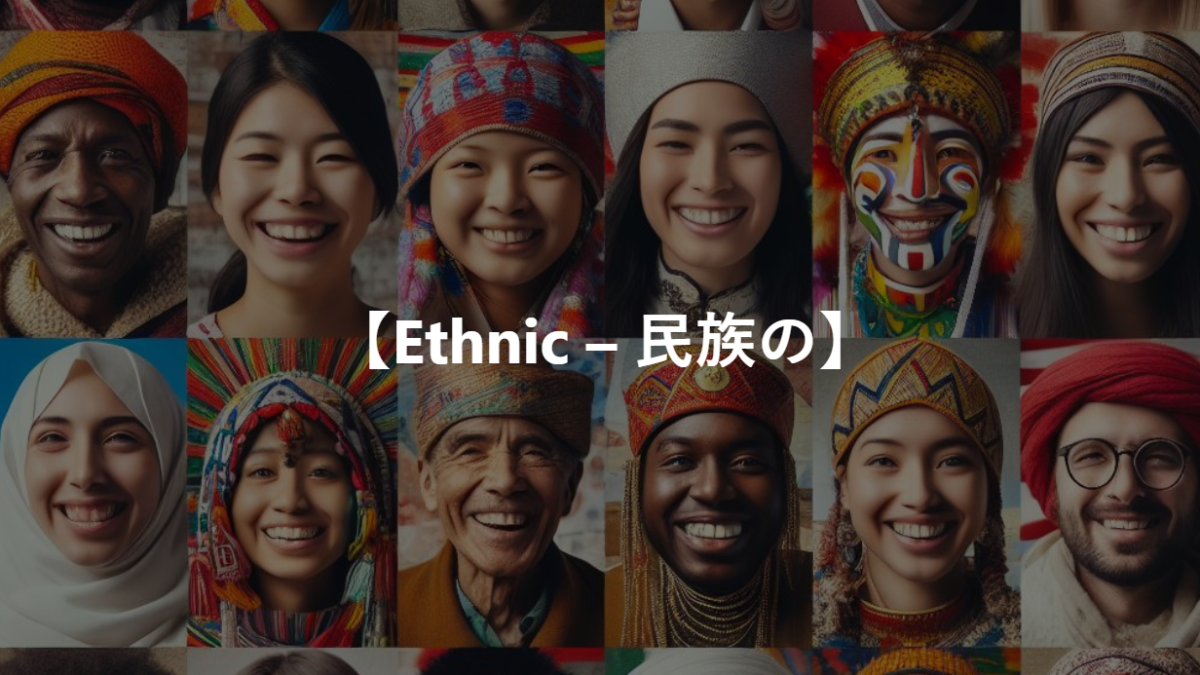「多様な ethnic のルーツが、豊かな文化を織りなす」
📚 意味と用法
ethnic は形容詞で、ある集団が共有する文化的背景、つまり「民族」や「人種」に関連することを示します。「民族料理 (ethnic food)」や「民族衣装 (ethnic costume)」、「民族集団 (ethnic group)」のように、他の名詞を修飾して使われることが非常に多いです。社会の多様性や文化的なアイデンティティについて語る際によく用いられます。
文化・集団
The city is proud of its diverse ethnic communities.
(その市は、多様な民族コミュニティを誇りに思っている。)
料理や物
Let’s go to that new ethnic restaurant downtown.
(ダウンタウンにある、あの新しいエスニック料理店に行こうよ。)
🕰️ 語源と歴史
「Ethnic」は、ギリシャ語で「国民、人々、部族」を意味する「ethnos」に由来します。これに形容詞を作る接尾辞「-ikos」が付いた「ethnikos」がラテン語を経て英語になりました。興味深いことに、初期のキリスト教では「ethnos」は「異教徒の民」を指す言葉として使われていました。その後、より中立的に「特定の文化的背景を持つ人々の集団」を指す言葉として定着しました。
🔄 類義語 (似た意味の言葉)
⚡ 対義語 (文脈による)
関連する対比
💬 実践的な例文
The festival celebrated the region’s rich ethnic diversity.
その祭りは、その地域の豊かな民族の多様性を祝うものだった。
We must work to eliminate ethnic discrimination.
民族差別をなくすために努力しなければならない。
The museum has a fine collection of ethnic art from around the world.
その博物館は、世界中から集められた民族芸術の素晴らしいコレクションを所蔵している。
The country is composed of several different ethnic groups.
その国は、いくつかの異なる民族集団から構成されている。
She wore a beautiful ethnic dress to the party.
彼女はパーティーに美しい民族衣装を着ていった。
🧠 練習問題
以下の空欄に入る最も適切な単語を選んでください。
1. Food from a particular culture, like Thai or Mexican food, is often called ______ food.
解説:
タイ料理やメキシコ料理のように、特定の文化に根差した料理は「エスニック料理 (ethnic food)」と呼ばれます。
2. A society with people from many different backgrounds has ______ diversity.
解説:
多くの異なる背景を持つ人々がいる社会は、「民族の (ethnic)」多様性があると言えます。
3. The noun form of “ethnic” is ______.
解説:
「民族性」や「民族的背景」を意味する名詞は「ethnicity」です。
4. ______ tensions can sometimes lead to conflict.
解説:
「民族間の (Ethnic)」緊張が紛争につながることがある、という文脈が最も自然です。
5. The word “ethnic” comes from the Greek word “ethnos,” which means ______.
解説:
語源セクションで説明した通り、「ethnos」は「国民や人々 (nation or people)」を意味します。

